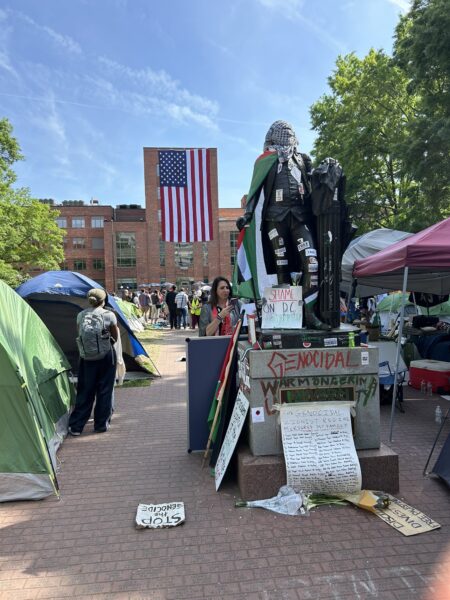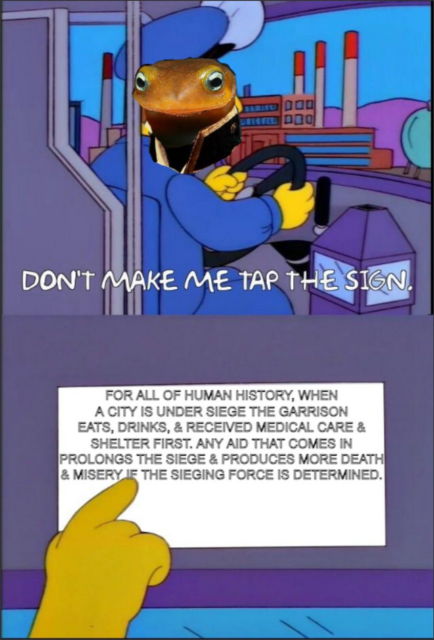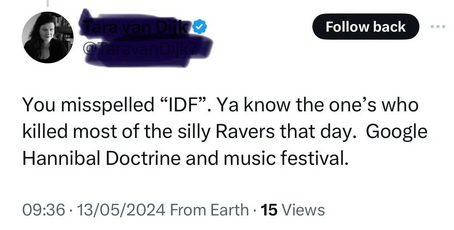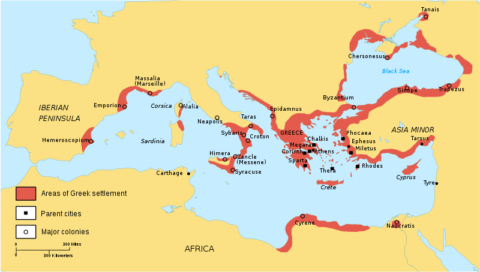Overly Sarcastic Productions
Published Apr 6, 2018Now that Caesar’s assassins are out of the picture, which would-be dictator will defeat the other to become the sole-ruler of Rome? In today’s episode of “How Long Before There’s Another Civil War?”: Not a lot … honestly not a very long time … BUT THEN WE GET THE ROMAN EMPIRE WOOOOOOOOO~~~
June 24, 2024
History Summarized: Augustus Versus Antony
May 29, 2024
A visit to failure pier
CDR Salamander has some advice for any US congresscritter with a spine (unfortunately, that probably means none of them):
This old operational planner has one bit of advice to Congress in their role of having oversight of the Executive Branch; subpoena the Decision Brief for the Gaza pier operation.
This was on the lowest of low scale of military operations, Humanitarian Assistance/Disaster Response. There is little to nothing classified about any of this rump of a capability. Call in member of the Joint Staff who were involved in this planning — and I would prefer if you could find a few terminal O5/6 to testify as well. You might actually enjoy some candor.
The Commander’s Intent, the Higher Direction and Guidance, the Planning Assumptions, the Constraints and Restraints, the Critical Vulnerability analysis, etc. It is all there. If not, the Chairman of the Joint Chiefs of Staff and the Secretary of Defense should tell the American people to their face.
This is a larger issue than anything happening in that impossible corner of the globe. Over the weekend, we saw yet more indications of an empire in decline deteriorating from bad to pathetic.
From the time the first load came off the pier, the aid barely made it past 300 meters until it disappeared into Hamasistan.
I’ll go ahead and tap the sign;
[…]
Generally this latest act in this other-end-of-the-Med-from-the-Greeks tragedy that has unfolded in front of everyone. As we saw at the top at Ashkelon Beach, first some ancillary bits floated over to Israel as the Eastern Mediterranean reminded everyone it is at the eastern end of a big sea with weather and waves and stuff.
We then found out that three soldiers were injured in a forklift accident. Just to add insult to injury, as the locals laughed, it appears more of the business end decided to try to make it to Haifa on its own.
[…]
I’m not sure how you scatter Army property all over the Eastern Med without a boot getting dry, but maybe I’m wrong. Gaza is lava, and all.
Empires don’t often die in a blaze of glory, no. More often than not they end in simpering apologies and excuses from poor leaders putting the wrong people in positions they have no place being, and when they fail — there is no accountability.
May 18, 2024
The plight of Greek refugees after the Greco-Turkish War
As part of a larger look at population transfers in the Middle East, Ed West briefly explains the tragic situation after the Turkish defeat of the Greek invasion into the former Ottoman homeland in Anatolia:

“Greek dialects of Asia Minor prior to the 1923 population exchange between Greece and Turkey. Evolution of Greek dialects from the late Byzantine Empire through to the early 20th century leading to Demotic in yellow, Pontic in orange, and Cappadocian in green. Green dots indicate Cappadocian Greek speaking villages in 1910.”
Map created by Ivanchay via Wikimedia Commons.
While I understand why people are upset by the Nakba, and by the conditions of Palestinians since 1948, or particular Israeli acts of violence, I find it harder to understand why people frame it as one of colonial settlement. The counter is not so much that Palestine was 2,000 years ago the historic Jewish homeland – which is, to put it mildly, a weak argument – but that the exodus of Arabs from the Holy Land was matched by a similar number of Jews from neighbouring Arab countries. This completely ignored aspect of the story complicates things in a way in which some westerners, well-trained in particular schools of thought, find almost incomprehensible.
The 20th century was a period of mass exodus, most of it non-voluntary. Across the former Austro-Hungarian, Russian and Ottoman empires the growth in national consciousness and the demands for self-determination resulted in enormous and traumatic population transfers, which in Europe reached its climax at the end of the Second World War.
Although the bulk of this was directed at Germans, the aggressors in the conflict, they were not the only victims – huge numbers of Poles were forcibly moved out of the east of the country to be resettled in what had previously been Germany. The entire Polish community in Lwów, as they called it, was moved to Wrocław, formerly Breslau.
Maps of central and eastern Europe in the 19th century would have shown a confusing array of villages speaking a variety of languages and following different religions, many of whom wouldn’t have been aware of themselves as Poles, Romanians, Serbs or whatever. These communities had uneasily co-existed under imperial rulers until the spread of newspapers and telegraph poles began to form a new national consciousness, usually driven by urban intellectuals LARPing in peasant fantasies.
This lack of national consciousness was especially true of the people who came to be known as Turks; the Balkans in the late 19th century had a huge Muslim population, most of whom were subsequently driven out by nationalists of various kinds. Many not only did not see themselves as Turks but didn’t even speak Turkish; their ancestors had simply been Greeks or Bulgarians who had adopted the religion of the ruling power, as many people do. Crete had been one-third Muslim before they were pushed out by Greek nationalists and came to settle in the Ottoman Empire, which is why there is still today a Greek-speaking Muslim town in Syria.
This population transfer went both ways, and when that long-simmering hatred reached its climax after the First World War, the Greeks came off much worse. Half a million “Turks” moved east, but one million Greek speakers were forced to settle in Greece, causing a huge humanitarian crisis at the time, with many dying of disease or hunger.
That population transfer was skewed simply because Atatürk’s army won the Greco-Turkish War, and Britain was too tired to help its traditional allies and have another crack at Johnny Turk, who – as it turned out at Gallipoli – were pretty good at fighting.
The Greeks who settled in their new country were quite distinctive to those already living there. The Pontic Greeks of eastern Anatolia, who had inhabited the region since the early first millennium BC, had a distinct culture and dialect, as did the Cappadocian Greeks. Anthropologically, one might even have seen them as distinctive ethnic groups altogether, yet they had no choice but to resettle in their new homeland and lose their identity and traditions. The largest number settled in Macedonia, where they formed a slight majority of that region, with many also moving to Athens.
The loss of their ancient homelands was a bitter blow to the Greek psyche, perhaps none more so than the permanent loss of the Queen of Cities itself, Constantinople. This great metropolis, despite four and a half centuries of Ottoman rule, still had a Greek majority until the start of the 20th century but would become ethnically cleansed in the decades following, the last exodus occurring in the 1950s with the Istanbul pogroms. Once a mightily cosmopolitan city, Istanbul today is one of the least diverse major centres in Europe, part of a pattern of growing homogeneity that has been repeated across the Middle East.
But the Greek experience is not unique. Imperial Constantinople was also home to a large Jewish community, many of whom had arrived in the Ottoman Empire following persecution in Spain and other western countries. Many spoke Ladino, or Judeo-Spanish, a Latinate language native to Iberia. Like the Greeks and Armenians, the Jews prospered under the Ottomans and became what Amy Chua called a “market-dominant minority”, the groups who often flourish within empires but who become most vulnerable with the rise of nationalism.
And with the growing Turkish national consciousness and the creation of a Turkish republic from 1923, things got worse for them. Turkish nationalists and their allies murdered vast numbers of Armenians, Greeks and Assyrian Christians in the 1910s, and the atmosphere for Jews became increasingly tense too, with more frequent outbursts of communal violence. After the First World War, many began emigrating to Palestine, now under British control and similarly spiralling towards violence caused by demographic instability.
May 13, 2024
Roman Legions – Sometimes found all at sea!
Drachinifel
Published Feb 2, 2024Today we take a quick look at some of the maritime highlights of the new special exhibition at the British Museum about the Roman Legions:
https://www.britishmuseum.org/exhibit…
(more…)
May 10, 2024
Table Manners in the Ottoman Empire – Acem Pilaf
Text from https://www.tastinghistory.com/recipes/ottomanpilaf:
At an Ottoman banquet, you were only ever meant to eat a few bites of each dish that was brought out (having more was seen as being greedy). But there was no danger of leaving the table hungry, as there could be upwards of dozens of dishes. To European visitors, the order that the dishes were brought out in made no sense. Cakes could be brought out between meat courses, a rich pastry brought out after fish, and fowl after chocolate cake. Amidst this seeming chaos, pilaf was always the last dish served.
Let’s address the elephant in the room and state that yes, the pilaf is supposed to come out layered and all in one piece, but mine did not. Ottoman dishes were meant to be not only flavorful, but beautiful as well. That being said, even if you mold yours in a separate container like I did, it is still delicious (and quite nice looking). The warm spices are a wonderful and unusual combination with the lamb (at least to my palate), and there is a fantastic array of textures.
“Chop a piece of good mutton into small pieces, place them in a pot … add one or two spoonfuls of fresh butter and after frying, take the cooked meat from the pot with a hand strainer. Finely chop three or four onions and fry them, then put the roasted meat on top. Then add plenty of pistachios, currants, cinnamon, cloves, and cardamom on top. After that, according to the old method, one measure of washed Egyptian rice. Add two measures of cold water without disturbing the rice, add sufficient salt, then close the lid of the pot and cover it thoroughly with dough. Boil it slowly on coals and when the water is absorbed, take the cover off, and turn the contents out of the pan onto a dish so it comes out intact. This makes a Pilaw that is very pleasing to the sight, and exceedingly pleasant to the taste.”
— Melceü’t-Tabbâhîn, 1844
May 9, 2024
How the First World War Created the Middle East Conflicts
The Great War
Published Dec 8, 2023The modern Middle East is a region troubled by war, terrorism, weak and failed states, and civil unrest. But how did it get this way? The map of today’s Middle East was mostly drawn after the First World War, and the war that planted many of the seeds of conflict that still plague Israel, Palestine, Iraq, Syria and even Iran today.
(more…)
May 8, 2024
The nonsensical “right of return” debate
George Monastiriakos explains why he should have the right of return to his ancestral homeland:
My family hails from a small Greek village in Anatolia, in modern day Turkey, but I have unfortunately never been to my ancestral homeland because I was born a “refugee” in Montreal. Living in the “liberated zone” of Chomedey, Que., one of the biggest Greek communities in Canada, is the closest I’ve ever felt to my beloved Anatolia.
The Republic of Turkey does not have a legal right to exist. It is an illegitimate and temporary colonial project built by and for Turkish settlers from Central Asia. My ancestors resided on the Aegean coast of Asia Minor for thousands of years before the first Turks arrived on horseback from the barren plains of Mongolia. I will never relinquish my right to return to my ancestral homeland.
If you think these assertions are ridiculous, it’s because they are. I copied them from the shallow, even childish, anti-Israel discourse that’s prevalent on campuses in the United States and Canada, including the University of Ottawa, where I studied and now teach. I am a proud Canadian citizen, with no legal or personal connection to Anatolia. I have no intention, or right, to return to my so-called ancestral homeland. Except, perhaps, for a much-needed vacation. Even then, my stay would be limited to the extent permitted by Turkish law.
The Second Greco-Turkish War concluded with the Treaty of Lausanne in 1923. Among other things, this agreement finalized the forced displacement of nearly one-million Ottoman Greeks to the Kingdom of Greece, and roughly 500,000 Greek Muslims to the newly formed Republic of Turkey. This ended the over 3,000 years of Greek history in Anatolia, and served as a model for the partition of British India, which saw the emergence of a Hindu majority state and a Muslim majority state some two decades later.
With their keys and property deeds in hand, my paternal grandmother’s family fled to the Greek island of Samos, on the opposite side of the Mycale Strait at a nearly swimmable distance from the Turkish coast. While they practised the Greek Orthodox religion and spoke a dialect of the Greek language, they were strangers in a foreign land with no legal or personal connection to the Kingdom of Greece.
The Great War channel produced an overview of the Greco-Turkish War of 1919-1923 that resulted in the vast human tragedy of the expulsion of ethnic Greek civilians from Anatolia and ethnic Turkish civilians from mainland Greece here.
May 5, 2024
The protests “will help Trump get an Electoral College landslide, just as the new left handily elected Nixon in 1968 and 1972”
Andrew Sullivan, the very model of a never-Trumper, sees the ongoing student protests feeding into a repeat of the 1968 and 1972 US Presidential elections:

“Patriotic students hung up an American Flag at George Washington University after pro-Palestine protesters trashed the campus, defaced the statue of George Washington, and removed an American Flag.”
Twitter image posted by Chaya Raichik – https://twitter.com/ChayaRaichik10/status/1786504098746958103/photo/1
As readers know, I’m deeply sympathetic to the argument that Israel has over-reached, over-bombed, and over-reacted in its near-unhinged overkill of Palestinian civilians, especially children, in the wake of 10/7’s horrors. It has been truly horrifying. I begrudge no one demonstrating passionately to protest this. But as I watch the rhetoric and tactics of many — but not all — of these students, I’m struck by how this humane concern is less prominent than the rank illiberalism and ideological extremism among many.
Preventing students from attending classes, taking exams, or even walking around their own campus freely is not a protest; it’s a crime. So is the destruction of property, and the use of physical intimidation and violence against dissenting students. The use of masks to conceal identity is reminiscent of the Klan, and antithetical to non-violent civil disobedience. It’s a way for outsiders to easily infiltrate and a way to escape responsibility for thuggishness. It’s menacing, ugly and cowardly.
It did not have to be this way. Imagine if students simply demonstrated peacefully for a cease-fire, placed the victims and hostages at the forefront of the narrative, and allowed themselves to be arrested proudly on camera and face legal consequences for their actions, as the civil rights movement did. Imagine if they were emphatically non-violent and always open to debate.
But they aren’t, because they are not the inheritors of the Christian, universalist civil rights movement but its illiberal, blood-and-soil nemesis, long curated in the Ivy League. The key group behind the protests, Students For Justice in Palestine, doesn’t mince words. It celebrated the explicitly genocidal murder of Jews on October 7:
National liberation is near — glory to our resistance, to our martyrs, and to our steadfast people! … Resistance comes in all forms — armed struggle, general strikes, and popular demonstrations. All of it is legitimate, and all of it is necessary.
The “our” is interesting. If you think these protests are only about Gaza — and not America — you’re missing the deeper context. Here’s a masked, keffiyeh-wearing spokeswoman for the UCLA protest:
Given the fact that the University of California is founded on colonialism, it’s inherently a violent institution. There needs to be an addressment of US imperialism and its ties to the UC system and how it perpetuates war and violence aboard — not only abroad, but also here, locally.
So violence is justified in response. Here’s a keffiyeh-clad spokesman at CUNY:
This revolution, which includes the mass demonstrations and encampments, are not just exclusively for students. It is for the masses. … It is for the free people of the world who are able to resist however you can — whether it be with a rock and other tools of liberation.
These are not fringe figures; they have been chosen to speak to the public. They believe in violence because there is nothing in their worldview that could prohibit it against certain “oppressor” races of people. As one of the “queer” leaders of the Columbia protest has said: “Zionists don’t deserve to live”, and “Be grateful that I’m not just going out and murdering Zionists”. He took his classes in decolonization seriously, even if he is now backtracking from their logical conclusion.
The illiberalism is deep and endemic. The civil rights movement was desperate for the press to show up; these thugs follow observers menacingly around, holding up barriers to prevent even fellow students from filming them. The civil rights movement ended physical borders between groups of human beings; these thugs create borders and police dissent. The civil rights movement asked America to live up to its ideals; the woke believe America is a source of evil in the world, and needs to be “decolonized”. “I love Osama [bin Laden]”, one pro-Palestinian demonstrator in New York City said. “I want to suck his dick”. That mix of evil and scatology is a woke trademark.
And these protests are clearly as much about the abolition of the Jewish state as they are the horror of Gaza. They are driven by the neoracist idea that “white-people-are-bad-but-black-and-brown-people-are-good”; they are about a blood-and-soil “anti-imperialism” that requires the abolition of any state not reflective of ancient indigenous populations. (The SJP refers to the US as “Turtle Island”, an allegedly indigenous name.) They are against “cultural appropriation” but prance around in keffiyehs. They glibly use the word “genocide” to trigger and re-traumatize Jews, while ignoring the genocidal goals of Hamas; and chants of “There Is Only One Solution: Intifada Revolution!” ring with echoes of Nazism.
And they will help Trump get an Electoral College landslide, just as the new left handily elected Nixon in 1968 and 1972.
It tells you something when even Al Sharpton is rattled by these violent fanatics. “How do the Democrats — how do all of us on that side — say January 6th was wrong if you can have the same pictures going on on college campuses?” he asked on MSNBC. It feels like 2020 again. Replacing Old Glory with the Palestinian flag or defacing a statue of George Washington (see above), is not how you win over the country. But the more you know about these fanatics the more you realize they don’t want to win over the country; they want to destroy it as mindlessly as the pro-Trump fringe. And they’d welcome the even deeper polarization he’d bring.
May 4, 2024
Shakespeare Summarized: Antony and Cleopatra
Overly Sarcastic Productions
Published Dec 2, 2016Hey, remember almost exactly three years ago when I summarized Julius Caesar? Published on December 1st, even? A coincidence I totally planned when I spontaneously decided to do this video today?
May 3, 2024
QotD: Colonialism in the ancient Mediterranean
We should start with a basic understanding of who we are talking about here, where they are coming from and the areas they are settling in. First we have our Greeks, who I am sure that most of our readers are generally familiar with. They don’t call themselves Greeks – it is the Romans who do (Latin: graeci); by the classical period they call themselves Hellenes (Έλληνες), a term that appears in the Iliad but once (Homer prefers Ἀχαιοί and Δαναοί, “Achaeans” and “Danaans”). That’s relevant because a lot of the apparent awareness of the Greeks (or more correctly, the Hellenes) as a distinct group, united by language and culture against other groups, belongs to late Archaic and early Classical and the phenomenon we’re going to look at begins during the Greek Dark Age (1100-800) and crests in the Archaic (800-480).
Greek settlement in the late Bronze Age (c. 1500-1100) was focused on the Greek mainland, though we have Greek (“Mycenean”) settlements on the Aegean islands (and Crete) and footholds on the west coast of Asia Minor (modern Turkey). Over the Dark Age – a period where our evidence is very poor indeed, so we cannot see very clearly – the area of Greek-speaking settlement in the Aegean expands and Greek settlements along that West coast of Asia Minor expand dramatically. Our ancient sources preserve legends about how these Greeks (particularly the Ionians, inhabiting the central part of that coastal strip) got there, having been supposedly expelled from Achaia on the northern side of the Peloponnese, but it’s unclear how seriously we should take those legends. But the key point here is that the outward motion of Greeks from mainland Greece proper begins quite early (c. 1100) and is initially local and probably not as organized as the subsequent second phase beginning in the 8th century, which is going to be our focus here.
Our other group are the Phoenicians. They did not call themselves that either; it derives from the Greeks who called them Phoinices (φοίνικες), which like the Roman Poeni may have had its roots in Egyptian fnḫw or perhaps Israelite Ponim.1 In any case, the word is old, as it appears in Linear B tablets dating to the Mycenean period (that 1500-1100 period). The Phoenicians themselves, if asked to call themselves something, would more likely have said Canaans, Kn’nm, though much like the Greeks tended to be Athenians, Spartans, Thebans and so on first, the Phoenicians tended to be Sidonians, Tyrians and so on first. They spoke a Semitic language which we call Phoenician (closely related to Biblical Hebrew) and they invented the alphabet to represent it; this alphabet was copied by the Greeks to represent their language, who were in turn copied by the Romans to represent their language, whose alphabet in turn was adopted by subsequent Europeans to represent their languages – which is the alphabet which I am writing with to you now.
Since at least the late bronze age, they lived in a series of city states on the eastern edge of the Mediterranean in Phoenicia in the Levant in what today would mostly be Lebanon. During the late bronze age, this was the great field of contested influence between the Hittite, (Middle) Assyrian and (New Kingdom) Egyptian Empires. The Late Bronze Age Collapse removed those external influences, leading to a quick recovery from the collapse and then efflorescence in the region. They had many cities, but the most important by this point are Sidon and Tyre; by the 9th century, Tyre emerged as chief over Sidon and may at times have controlled it directly, but this was short lived as the whole region came under the control of the (Neo)Assyrian Empire in 858. The Assyrians demanded heavy tribute (which may contribute to colonization, discussed below) but only vassalized rather than annexed Tyre, Byblos and Sidon, the three largest Phoenician cities.
Both the Greeks and the Phoenicians have one thing in common at the start, which is that these are societies oriented towards the sea. Their initial area of settlement is coastal and both groups were significant sea-faring societies even during the late Bronze Age and remained so by the Archaic period. Both regions, while not resource poor (Phoenicia was famous for its timber, Lebanese cedar), are not resource rich either, particularly in agricultural resources. Compared to the fertility of Mesopotamia, Egypt or even Italy, these were drier, more marginal places, which may go some distance to explaining why both societies ended up oriented towards the sea: it was there and they could use the opportunities.
Bret Devereaux, “Collections: Ancient Greek and Phoenician Colonization”, A Collection of Unmitigated Pedantry, 2023-10-13.
1. The former is what I’ve found in dictionary entries for etymologies, the latter is what Dexter Hoyos suggests, Carthaginians (2010), 1. I am not an expert on Semitic languages, linguistics or etymologies, so don’t ask me to decide between them.
April 29, 2024
Greek History and Civilization, Part 7 – Alexander
seangabb
Published Apr 28, 2024This seventh lecture in the course covers the career of Alexander the Great and its consequences for the world.
(more…)
April 18, 2024
What to do if Romans Sack your City
toldinstone
Published Jan 12, 2024Chapters:
0:00 Introduction
0:34 Progress of a siege
1:55 Looting and violence
3:42 Recorded atrocities
4:45 Captives
5:27 BetterHelp
6:36 Surviving a Roman sack
7:13 Where to hide
8:27 What to do if you’re captured
9:20 Advice for women
10:09 The fate of captives
(more…)
April 15, 2024
QotD: Cereal cultivation also helped grow the centralized state
Sumer just before the dawn of civilization was in many ways an idyllic place. Forget your vision of stark Middle Eastern deserts; in the Paleolithic the area where the first cities would one day arise was a great swamp. Foragers roamed the landscape, eating everything from fishes to gazelles to shellfish to wild plants. There was more than enough for everyone; “as Jack Harlan famously showed, one could gather enough [wild] grain with a flint sickle in three weeks to feed a family for a year”. Foragers alternated short periods of frenetic activity (eg catching as many gazelles as possible during their weeklong migration through the area) with longer periods of rest and recreation.
Intensive cereal cultivation is miserable work requiring constant toil with little guarantee of a good harvest. Why would anyone leave this wilderness Eden for a 100% wheat diet?
Not because they were tired of wandering around; Scott presents evidence that permanent settlements began as early as 6000 BC, long before Uruk, the first true city-state, began in 3300. Sometimes these towns subsisted off of particularly rich local wildlife; other times they practiced some transitional form of agriculture, which also antedated states by millennia. Settled peoples would eat whatever plants they liked, then scatter the seeds in particularly promising-looking soil close to camp – reaping the benefits of agriculture without the back-breaking work.
And not because they needed to store food. Hunter-gatherers could store food just fine, from salting animal meat to burying fish and letting it ferment to just having grain in siloes like everyone else. There is ample archaeological evidence of all of these techniques. Also, when you are surrounded by so much bounty, storing things takes on secondary importance.
And not because the new lifestyle made this happy life even happier. While hunter-gatherers enjoyed a stable and varied diet, agriculturalists subsisted almost entirely on grain; their bones display signs of significant nutritional deficiency. While hunter-gatherers were well-fed, agriculturalists were famished; their skeletons were several inches shorter than contemporaneous foragers. While hunter-gatherers worked ten to twenty hour weeks, agriculturalists lived lives of backbreaking labor. While hunter-gatherers who survived childhood usually lived to old age, agriculturalists suffered from disease, warfare, and conscription into dangerous forced labor.
Scott Alexander, “Book Review: Against The Grain“, Slate Star Codex, 2019-10-15.
March 30, 2024
QotD: Multiculturalism, in theory and practice
The creed of contemporary multiculturalism sought to establish that all societies were roughly equal and that the “other” was but a crude Western fiction. But we were reminded that people like the Taliban who did not vote, treated women as chattel, and whipped and stoned to death dissenters of their primordial world were different folk from citizens of democracy. A chief corollary to such cultural relativism was that Americans have wrongly embraced a belief in the innate humanity of the West largely out of ethnocentric ignorance. But surely the opposite has been proven true: the more Americans after September 11 learned about the world of the madrassas, the six or seven varieties of Islamic female coverings, the Dickensian Pakistani street, and the murderous gangs in Somalia, Sudan, and Afghanistan, then the more not less, they are appalled by societies that are so anti-Western.
Victor Davis Hanson, Ripples of Battle, 2003.







